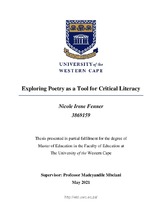| dc.contributor.advisor | Mbelani, Madeyandile | |
| dc.contributor.author | Fenner, Nicole Irene | |
| dc.date.accessioned | 2022-01-25T07:39:43Z | |
| dc.date.issued | 2021 | |
| dc.identifier.uri | http://hdl.handle.net/11394/8647 | |
| dc.description | Magister Educationis - MEd | en_US |
| dc.description.abstract | The use of literature-based reading has a significant impact on the development of critical literacy (Tung and Chang, 2009). Based on the Cultural-Historical Activity Theory and Vygotsky’s theory of collaborative learning, this interpretive qualitative case study aimed at exploring how Grade 10 English Home Language poetry was taught in the development of critical literacy. Research was conducted at two schools in the Northern Suburbs of Cape Town in which lesson observations, focus group discussions, post-observation interviews, and field notes were used to amass data. Cultural-Historical Activity Theory, Critical Discourse Analysis, and insights from Boler’s (1999) pedagogy of discomfort were used to analyse data. This study found that despite teachers’ being favourably disposed towards poetry, they harbour covert feelings of inadequacy in teaching the genre which lead to the adoption of coping mechanisms. | en_US |
| dc.language.iso | en | en_US |
| dc.publisher | University of Western Cape | en_US |
| dc.subject | Grade 10 English home language | en_US |
| dc.subject | Critical literacy | en_US |
| dc.subject | Poetry | en_US |
| dc.subject | CAPS | en_US |
| dc.subject | Democratic citizenship education | en_US |
| dc.title | Exploring poetry as a tool for critical literacy | en_US |
| dc.rights.holder | University of Western Cape | en_US |
| dc.description.embargo | 2023 | |

